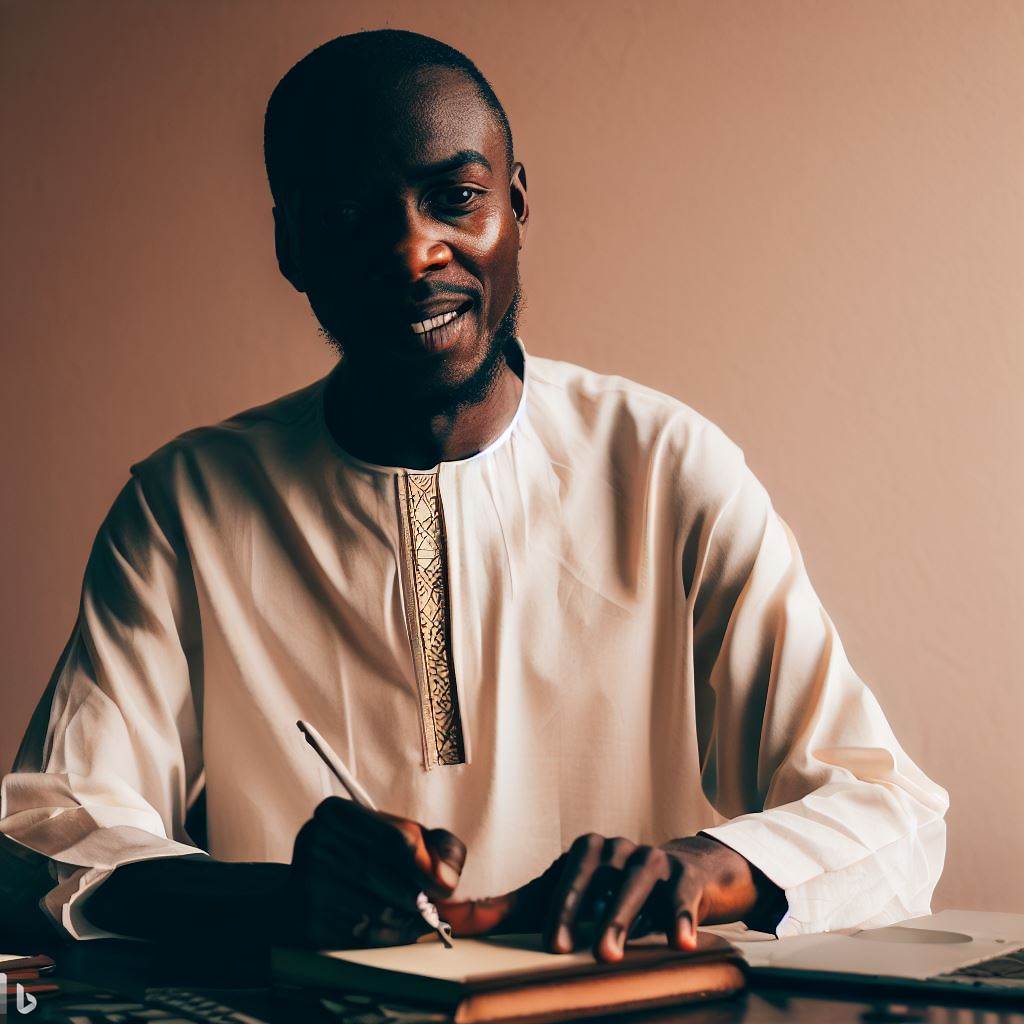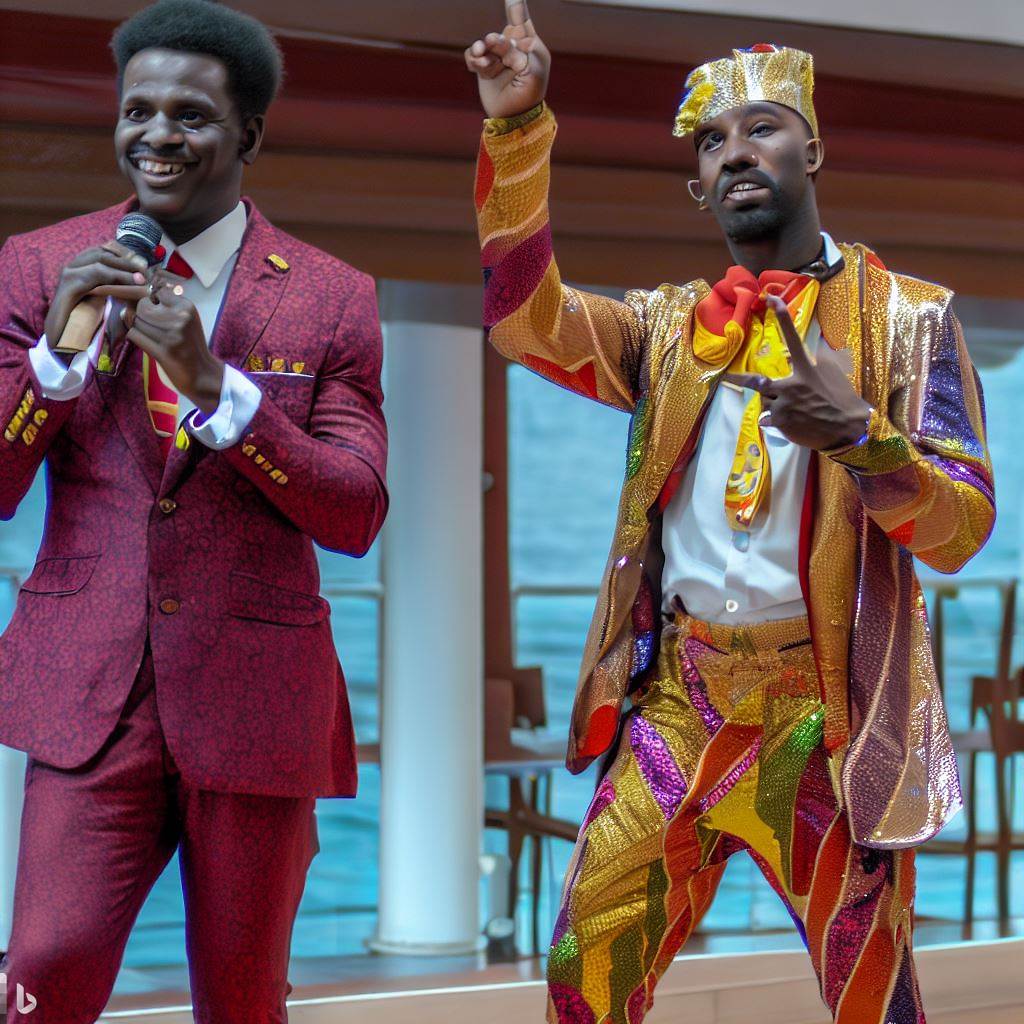Introduction
Creative writing plays a significant role in Nigeria as it gives a platform for self-expression and cultural preservation.
The scope of creative writing in Nigeria is vast, including various genres like poetry, fiction, and drama, providing opportunities for both aspiring and established writers.
Creative writing in Nigeria holds immense significance, fostering cultural preservation, self-expression, and societal dialogue.
Scope
- Literary Diversity: Nigeria’s rich cultural tapestry fuels a diverse range of themes, genres, and narratives.
- Emerging Voices: A wave of young Nigerian writers is making global literary waves, amplifying fresh perspectives.
- Multilingual Landscape: The nation’s linguistic variety offers avenues for storytelling in various languages, broadening outreach.
- Historical Exploration: Creative writing delves into Nigeria’s history, unearthing untold stories and lessons for the present.
- Digital Age: Online platforms and social media have democratized publishing, providing writers new channels for dissemination.
- Academic Integration: Creative writing courses in Nigerian universities nurture future wordsmiths, blending academia with artistry.
- Film and TV: Scripts and screenplays contribute to Nigeria’s booming film industry, Nollywood, shaping visual storytelling.
- Civic Engagement: Writers address sociopolitical issues, sparking conversations that catalyze positive change.
- Healing Through Words: Creative expression serves as a therapeutic outlet, aiding individuals and communities in healing.
Opportunities
- Publishing: Traditional and digital publishing avenues grant exposure and recognition for literary works.
- Content Creation: Advertising, branding, and content agencies seek skilled writers for marketing materials.
- Freelancing: Writing for websites, blogs, and magazines offers freelancers flexibility and a global client base.
- Literary Festivals: Festivals like Ake Arts and Book Festival provide platforms for networking and showcasing work.
- Writing Workshops: Facilitating workshops and mentoring aspiring writers fosters a nurturing community.
- Scriptwriting: Demand for scripts in film, television, and theater creates opportunities for narrative architects.
- Academic Writing: Research institutions seek writers to communicate complex ideas to wider audiences.
- Authorship: Publishing novels, poetry collections, and short stories establishes writers as literary voices.
- Translation: Adapting Nigerian literature into different languages bridges cultural gaps and reaches broader readerships.
In summary, creative writing in Nigeria is a dynamic realm of artistic exploration, holding both cultural and economic value.
Its scope is vast, encompassing various mediums and genres, while opportunities are abundant for those willing to wield the pen.
Background on Creative Writing in Nigeria
The historical development of creative writing in Nigeria
Creative writing in Nigeria has a rich history that dates back to pre-colonial times. Oral literature was the primary form of storytelling, with folktales, myths, and proverbs being passed down through generations.
These stories were not only entertainment but also served as a means of preserving cultural identity and values.
With the advent of colonialism in the late 19th century, written literature began to emerge in Nigeria. The Nigerian literary tradition was heavily influenced by both European literature and indigenous oral traditions.
Early Nigerian writers, such as Amos Tutuola and Cyprian Ekwensi, fused these influences to create unique narratives that captured the essence of Nigerian life.
Renowned Nigerian authors and their contributions to the field
Nigeria has produced numerous renowned authors who have made significant contributions to the field of creative writing.
Chinua Achebe, often considered the father of modern African literature, gained international acclaim with his novel “Things Fall Apart.”
His works explored the complexities of colonialism and its impact on African societies.
Wole Soyinka, Nigeria’s first Nobel laureate in Literature, challenged societal norms and political oppression through his plays and poetry.
His work, such as “A Dance of the Forests” and “Death and the King’s Horseman,” exposed the flaws and hypocrisies of postcolonial Nigeria.
Other notable Nigerian authors include Chimamanda Ngozi Adichie, whose novels “Half of a Yellow Sun” and “Americanah” have garnered critical acclaim worldwide, and Ben Okri, who won the Booker Prize for his novel “The Famished Road.”
The impact of Nigerian literature on the global literary scene
Literature has made a significant impact on the global literary scene. Nigerian authors have gained worldwide recognition, and their works have been translated into multiple languages, expanding their reach.
Nigerian literature has offered a unique perspective and narrative voice. It addresses themes and issues that resonate with readers globally, such as identity, race, colonialism, and postcolonialism.
Through their storytelling, Nigerian authors have shaped and enriched the global literary canon. Nigerian literature has also inspired a new generation of writers and readers.
The success of authors like Achebe and Adichie has encouraged aspiring writers in Nigeria and beyond to explore their creative potential.
It has also sparked a resurgence of interest in African literature as a whole, leading to increased publishing opportunities for African voices.
In the end, creative writing in Nigeria has a rich history and has made significant contributions to the global literary scene.
From the early fusion of oral tradition and European influences to the emergence of renowned Nigerian authors, the country’s literary tradition continues to thrive.
Nigerian literature offers a unique perspective that resonates with readers worldwide, and its impact extends beyond its borders.
As the field continues to grow, there are boundless opportunities for aspiring Nigerian writers to make their mark in the world of creative writing.
Read: How Nigerian Writers are Telling Africa’s Stories
Scope of Creative Writing in Nigeria
The various genres of creative writing practiced in Nigeria
- Poetry: Poetry is a widely embraced genre in Nigerian creative writing, characterized by rich imagery and emotional depth.
- Prose: Prose writing in Nigeria encompasses different forms such as novels, short stories, and essays.
- Drama: Nigerian playwrights excel in creating compelling dramas that explore various societal issues.
Themes and subjects commonly explored in Nigerian creative writing
Nigerian creative writing delves into a wide range of themes and subjects, reflecting the nation’s diverse and vibrant culture.
The exploration of identity and cultural heritage is a recurring theme in Nigerian creative writing. Authors often depict the struggle of individuals to reconcile their traditional values with modern influences.
Socio-political issues are also prevalent in Nigerian literature. Writers shed light on corruption, inequality, and the challenges faced by ordinary citizens, providing social commentary and advocating for positive change.
Nigerian creative writing frequently highlights the strength and resilience of its people, celebrating the power of hope, perseverance, and community bonds.
Notable literary events, festivals, and awards in Nigeria
Nigeria has a thriving literary scene with several events, festivals, and awards that promote and celebrate creative writing.
The Ake Arts and Book Festival is a prominent literary event that brings together renowned authors, scholars, and book lovers from Nigeria and beyond. It offers a platform for discussions, readings, and performances.
The Lagos International Poetry Festival is a vibrant gathering of poets, spoken word artists, and enthusiasts. It features performances, workshops, and panel discussions, fostering a rich poetry community.
The Nigeria Prize for Literature is a prestigious literary award established by the Nigerian Liquefied Natural Gas (NLNG) company.
It recognizes outstanding literary works in Nigeria, encouraging writers to produce exceptional creative works.
Other notable events and festivals include the Port Harcourt Book Festival, Kaduna Book and Arts Festival, and the Etisalat Prize for Literature.
In fact, creative writing in Nigeria encompasses various genres such as poetry, prose, and drama. It explores themes of identity, socio-political issues, and resilience.
Nigeria also hosts numerous literary events, festivals, and awards that contribute to the vibrant literary landscape of the country.
Read: Key Skills for Cruise Ship Entertainers in Nigeria

Uncover the Details: The Impact of Culture on Nigerian Circus Performance
Opportunities in Creative Writing in Nigeria
The growth of the publishing industry in Nigeria
The creative writing scene in Nigeria is experiencing a surge in opportunities due to the growth of the publishing industry.
Publishing houses have emerged as strong platforms for aspiring Nigerian writers to showcase their skills and gain recognition.
In recent years, there has been a remarkable increase in the number of Nigerian publishers who actively seek out new talents.
These publishers provide a platform for writers to share their work with a wider audience. As a result, aspiring writers are now able to publish their works and gain exposure, both locally and internationally.
Emergence of literary magazines and online platforms for writers
Alongside the growth of traditional publishing, Nigeria has witnessed the emergence of literary magazines and online platforms that serve as avenues for writers to showcase their creative abilities.
These platforms often invite submissions from writers, providing them with an opportunity to have their work featured.
Literary magazines such as Saraba, Brittle Paper, and Kalahari Review have gained popularity for publishing exceptional works by Nigerian writers.
Online platforms like OkadaBooks and AfricanWriter.com have made it even easier for writers to share their stories with a wider audience, breaking down geographical barriers.
The availability of writing workshops, courses, and mentorship programs
Nigeria’s creative writing landscape offers numerous opportunities for writers to further develop their skills through workshops, courses, and mentorship programs.
These initiatives aim to nurture budding writers and enhance their potential.
Organizations such as the Farafina Trust, the Association of Nigerian Authors (ANA), and the Nigeria Writers Series (NWS) regularly organize workshops and training sessions conducted by renowned writers locally and internationally.
These programs provide an avenue for writers to learn from established authors, refine their craft, and network with fellow writers.
The rise of self-publishing and digital publishing platforms for aspiring writers
Self-publishing has become a viable option for aspiring writers in Nigeria. With the rise of digital publishing platforms, writers can independently publish their works and reach a global audience.
This opportunity gives writers creative control over their projects and eliminates the need for traditional publishing houses.
Platforms like OkadaBooks and Smashwords allow writers to publish their books digitally, ensuring their works are accessible to readers worldwide.
This democratization of the publishing process has empowered Nigerian writers to bring their stories to life without relying solely on traditional publishing channels.
Opportunities for collaboration with other creatives like illustrators, editors, and translators
In addition to the writing industry itself, creative writers in Nigeria are presented with opportunities for collaboration with other professionals.
Collaborating with skilled illustrators, editors, and translators can enhance the overall quality and marketability of their work.
Working with illustrators can enrich storytelling by adding visual elements that captivate readers. Editors provide essential feedback to polish the writing, ensuring it meets professional standards.
Translators help bridge the gap between Nigerian authors and international audiences by making their works accessible in different languages.
In a nutshell, the scope of creative writing opportunities in Nigeria expands beyond simply writing and publishing.
The growth of the publishing industry, the emergence of literary magazines and online platforms, the availability of workshops and mentorship programs, the rise of self-publishing and digital platforms, and opportunities for collaboration with other creatives greatly contribute to the flourishing creative writing scene in Nigeria.
Aspiring writers in Nigeria now have access to a wide range of avenues to showcase their talent and achieve success in the field of creative writing.
Read: Youth and Writing: A Look at Nigerian Millennials
Challenges Faced in Creative Writing in Nigeria
Lack of Adequate Funding and Support for Writers
- Insufficient financial backing and support hinders the growth of creative writing in Nigeria.
- Many talented writers struggle to find resources and funding to pursue their craft.
- Lack of government funding and private investments restricts the development of the writing industry.
- Limited access to grants, scholarships, and fellowships further exacerbates the financial challenges faced by writers.
- Adequate funding and support systems should be established to promote and nurture the talents of Nigerian writers.
Limited Availability of Literary Agents and Publishing Opportunities
- The scarcity of literary agents in Nigeria poses a significant challenge for writers seeking representation.
- Most writers face difficulties in finding literary agents who can help them market their work.
- Limited publishing opportunities hinder the visibility and success of Nigerian writers.
- The absence of a robust publishing industry restricts the availability of platforms for writers to showcase their work.
- The establishment of more literary agencies and publishing houses could provide better opportunities for aspiring writers.
The Influence of Censorship on Creative Expression
- Censorship in Nigeria negatively affects creative expression and limits the freedom of writers.
- Government regulations often impose restrictions on topics, themes, and content that writers can explore.
- Fear of censorship leads to self-censorship, where writers avoid controversial or sensitive subjects.
- The stifling of creative expression hampers the development of diverse and thought-provoking writing.
- Advocacy for artistic freedom and the relaxation of censorship policies can encourage creativity in Nigerian writing.
Need for Improved Infrastructure and Resources for Writers
- Inadequate infrastructure and resources undermine the growth of creative writing in Nigeria.
- Limited access to libraries, writing centers, and writing workshops impedes the development of writing skills.
- Insufficient technological resources restrict writers’ ability to research, edit, and publish their work efficiently.
- More writing retreats, residencies, and workshops should be established to provide a conducive environment for writers.
- Investment in modern infrastructure and the provision of writing-related resources can elevate the quality of Nigerian literature.
In review, the challenges faced in creative writing in Nigeria are multidimensional and require attention and intervention.
Adequate funding and support, increased availability of literary agents and publishing opportunities, the reduction of censorship, and improved infrastructure and resources are crucial for the growth and success of Nigerian writers.
By addressing these challenges, Nigeria can unlock the full potential of its creative writing industry and contribute significantly to the literary landscape.
Read: Understanding the Market for Nigerian Writers Abroad
Conclusion
Creative writing in Nigeria has a wide scope and numerous opportunities. It is crucial to recognize the importance of fostering creativity and supporting Nigerian writers.
Scope and Opportunities:
- Diverse Genres: Nigeria’s creative writing spans poetry, fiction, non-fiction, drama, reflecting its rich culture.
- Emerging Authors: Young talents bring fresh perspectives to global literary conversations, shaping the future.
- Multilingual Narratives: Writing in local languages preserves heritage and widens literary horizons.
- Digital Age: Online platforms enable global reach, making publishing and sharing more accessible.
- Film and TV: Scriptwriting fuels Nollywood, while storytelling takes visual and auditory forms.
- Literary Festivals: Ake Arts, Lagos International Poetry Festival offer networking and learning platforms.
- Freelancing: Writers craft content for businesses, websites, expanding professional opportunities.
- Publishing Boom: Traditional, self-publishing avenues amplify voices, contributing to the literary tapestry.
Fostering Creativity and Support:
Nurturing creativity is vital. Supporting Nigerian writers means preserving culture, encouraging innovation.
Embrace the Literary Landscape:
Explore Nigerian literature. Contribute your stories. Engage in discussions. Enrich the vibrant literary tapestry.
I encourage readers to explore and contribute to the vibrant literary landscape in Nigeria.




